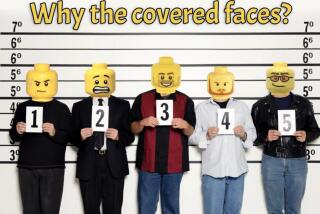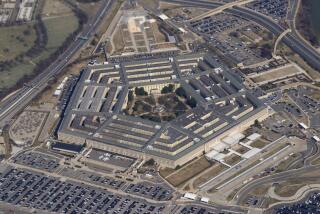Times explains use of photos of U.S. soldiers, body parts
Key editors at the Los Angeles Times on Wednesday explained the decision to publish a story and pictures of U.S. soldiers posing with body parts of Afghan suicide bombers, after questions were raised by the White House, the Pentagon and readers.
In a live chat on latimes.com, Editor Davan Maharaj explained the decision to publish the material, especially the pictures, even though the events occurred two years ago. The publication comes at an especially sensitive time, with the U.S. and its NATO allies seeking to disengage from the Afghanistan war that began in October 2001.
“We considered this very carefully,” Maharaj said. “At the end of the day, our job is to publish information that our readers need to make informed decisions. We have a particular duty to report vigorously and impartially on all aspects of the American mission in Afghanistan. On balance, in this case, we felt that the public interest here was served by publishing a limited, but representative sample of these photos, along with a story explaining the circumstances under which they were taken.”
In response to a reader’s question about how the photographs were selected, Maharaj said taste and relevance were the guiding principles.
“The two photos published were chosen because they clearly and unambiguously depict conduct that the Army described as inappropriate. In examining the full set of images, we set aside others on grounds of taste, relevance or repetitiousness. Some were too gruesome. Others were very similar to the two images already chosen or were difficult to interpret,” he said.
In introducing the online chat, National Editor Roger Smith explained that The Times had published a story and two photographs on Wednesday outllining “how a unit of the 82nd airborne mugged and posed with remains when sent on two missions to attempt to get identification of the dead bombers.”
The Pentagon, the White House and top commanders and diplomats in Afghanistan have condemned the action by the soldiers and have launched investigations. The Defense Department had asked The Times not to run the photos, Smith said.
On Wednesday, top officials said they were unhappy with the decision to publish the pictures. Speaking to reporters en route to Ohio on Air Force One, White House spokesman Jay Carney said: “We’re also very disappointed that -- or at least I will echo what the Defense Department said about the decision made to publish these photographs two years after the incident.”
Carney condemned the soldiers’ actions, calling them “reprehensible.”
The fear among some officials is that the latest trophy photos will be used as an excuse for further unrest in Afghanistan, similar to what happened when previous photographs were made public.
But Maharaj said that the safety of troops was among The Times’ concerns.
“The photographs were provided by a soldier in the unit “who was himself concerned that the photos reflected dysfunction in discipline and a breakdown in leadership that compromised the safety of the troops,” Maharaj said.
He went on to say that the newspaper weighed the impact of publication on troop safety and that reporter David Zucchino had numerous conversations with the appropriate military officials.
“When we made the decision to publish, the Pentagon asked us to wait 24 additional hours to protect troops depicted in the photographs,” Maharaj said. “We agreed to push back our publication date until the Pentagon told us they had taken the necessary precautions.
“In fact, we waited more than 72 hours after their request,” he said.
RELATED:
U.S. troops posed with body parts of Afghan bombers
Officials denounce troops posing with dead Afghans
Afghans revolted by U.S. troops posing with dead suicide bombers
More to Read
Sign up for Essential California
The most important California stories and recommendations in your inbox every morning.
You may occasionally receive promotional content from the Los Angeles Times.











